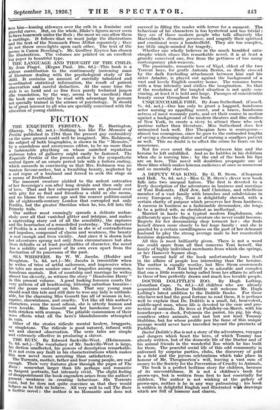THE RUIN. By . Edward Sackville-West. (Heinemann. 7s. 6d. net.)—The vocabulary
of Mr. Sackville-West is large, his diction unaffected, his powers of description remarkable. It is not even any fault in his characterizations which makes this new novel more arresting than satisfactory. The Torrents, mother, father and four young people, are real enough. Their very features glow through the pages of The Ruin somewhat larger than life perhaps and romantic as Sargent portraits, but intensely vivid. The slight feeling of disappointment the book engenders arises from the author's Present weakness in creating behaviour. His Torrents exist, but he does not quite convince us, that they would behave as he bids us believe. All very well to call The Ruin a C.othic novel : the author is no Romantic and does not succeed in filling the reader with terror for a moment. The behaviour of his characters is too hysterical and too trivial : they are of those modern people who talk alluSively like Maeterlinck's dramatis personae, and magnify their spiritual and emotional woes a hundredfold. They are too complex, too little single-minded for tragedy. - Whether one wholly believes in the much heralded cata- strophe which closes this remarkable novel, it is at least a grandly conceived one, free from the pettiness of too many contemporary plot-weavers.
The passionate, romantic love of Nigel, eldest of the two Torrent boys, for gentle Antonia Berrin, so direly crossed by the dark foreboding attachment between him and his sister Ariadne, is played out against the background of a vast and lovely English country house. The romance burns with a true intensity and strikes the imagination. So that if the resolution of the tangled situation is not quite con- vincing, at least it is bold and large. Passages of considerahle beauty occur throughout the book.






























































 Previous page
Previous page